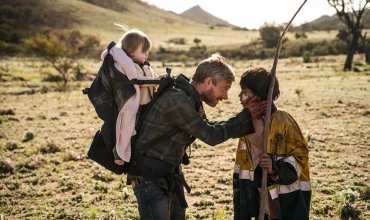French writer-director Lorraine Levy’s new feature THE OTHER SON (Le fils de L’autre) is a melodrama that seeks to investigate the human stories that lie beneath the Israeli-Palestinian conflict. The premise is old indeed. Babies are accidentally switched at birth and each grows up living the life intended for the other. The consequences of this mix-up are particularly devastating given the fact that the two children belong to families from either side of the West Bank Wall. As two unrelated group of people, the families are fundamentally opposite in almost every way.
We are shown the stark contrast between the hemmed in, poor, dusty world that Yacine Al Bezaaz (Debhi) lives in and the cosmopolitan life that Joseph Silberg (Sitruk) has in Tel Aviv. Both boys begin the story believing they know who they are. Joseph is Jewish. Yacine is Arab. Who they are and who they hate is predicated on this knowledge. Ironically it is a blood test that first causes some doubts. Blood is a theme that all the characters return to as they discuss the bloodlines of their people. This is no easy secular tale where nurture trumps nature, rather the people on both sides of the conflict have everything invested in religion and history.
Yacine’s brother Bilal is disgusted when he discovers the boy he always considered his brother is, as he puts it, one of the “occupying forces”. The fathers have difficulty expressing their emotions. The mothers feel as if they have a missing child. Lorraine Levy elicits some fine performances from her international cast. Emmanuelle Devos is moving as Orthi Silberg. We see through her eyes the slow realisation that the child she has raised for 18 years was not the one she gave birth to. She is the most mentally and emotionally flexible of the adult characters. It is she who is the first to sense their may be some positives in this upheaval they’re going through.
Levy wants us to see what happens to these two families when they are forced to confront each other as human beings rather than through the lens of propaganda. The premise is highly contrived, but it is in service to Levy’s purpose. Treating the despised other as a human being requires trust. Levy takes her characters through a series of incidents where they have to question their presumptions about family, history and heritage. The film makes the audience consider what we would do if we woke tomorrow and discovered our identity was fundamentally altered. What if we weren’t the person we were told we were?
The degree to which the story works will depend on how willing one is to be open to the emotion and interplay of the characters and whether one is prepared to accept the film’s premise, which I will express with the oft-used punchline: Why can’t we all just get along? This tagline assumes that conflict between people is human nature, and therefore peace is an impossible dream, Levy asks the question seriously.
If you enjoy melodrama, hypotheticals and politics, then THE OTHER SON mixes these elements with some verve and and feeling. 105 minutes. Mostly in French with English subtitles. (6/10)

